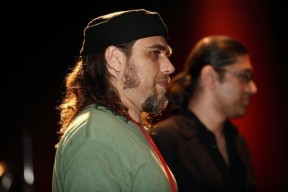Coke Studio had stolen my heart way back in 2008 and my friends would look at me in puzzlement when I put up excited status updates about CS. For those who still don’t know what Coke Studio is and suspect it is a rave destination, here is a short summary: In a studio setting in Pakistan (actually a warehouse in Karachi), musicians from various backgrounds (pop, soft rock, eastern classical) jam together live. This is then telecast. The entire exercise is sponsored by Coca Cola and hence the name. Brainchild of Rohail Hyatt (in the picture above), a former band member of Vital Signs, Coke studio was a big hit in its first season. It saw folksy strains, western rhythms, eastern alaaps (as the website mentions in solemn political correctness) all meshing together with mind-blowing results. You have to hear it to believe it. (www.cokestudio.com.pk)
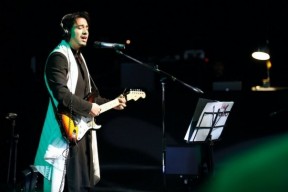 Till very recently, Coke Studio Season 1 had its own website whose profile felt like an embarrassed apology. We are in the 21st century, we better have a website.. it said. You could almost see the website’s shy smile and hands turning a handkerchief over and over again in nervousness. That was the beginning of my romance with Coke Studio. It had astounding little gems. Rahat Fateh Ali Khan giving a near-perfect tribute to the master with Shaman Paiyan…Nusrat would have clapped; Ali Zafar bemused by the applause for a jesty rendition of Channo (yes, it had a live audience in the first season) and Strings performing Duur with a disarming, inadvertent shuru karey into the microphones before they began.
Till very recently, Coke Studio Season 1 had its own website whose profile felt like an embarrassed apology. We are in the 21st century, we better have a website.. it said. You could almost see the website’s shy smile and hands turning a handkerchief over and over again in nervousness. That was the beginning of my romance with Coke Studio. It had astounding little gems. Rahat Fateh Ali Khan giving a near-perfect tribute to the master with Shaman Paiyan…Nusrat would have clapped; Ali Zafar bemused by the applause for a jesty rendition of Channo (yes, it had a live audience in the first season) and Strings performing Duur with a disarming, inadvertent shuru karey into the microphones before they began.
Then there were of course Ali Azmat and Rahat completely stealing the show and the season with their Garaj Baras. It indeed roared and rained so hard and so long that I suspect it gave enough confidence to Rohail Hyatt, the quiet star of Vital Signs, to dream of a second, more robust season.
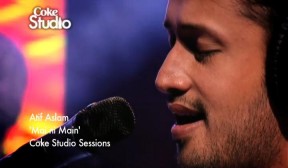 And dream he did. And dreamed up a season of performances that had magic written in permanent markers all over it. What began as a river swelled up to breach its banks and flooded minds that were willing to be overtaken. It had Ali Zafar choking with emotion and stopping midway while singing Dastan-e-ishq and it had Atif’s voice soaring up and down, through nooks and corners, upon rocks and below caves while singing Mai Ni. In other words, goosebumps.
And dream he did. And dreamed up a season of performances that had magic written in permanent markers all over it. What began as a river swelled up to breach its banks and flooded minds that were willing to be overtaken. It had Ali Zafar choking with emotion and stopping midway while singing Dastan-e-ishq and it had Atif’s voice soaring up and down, through nooks and corners, upon rocks and below caves while singing Mai Ni. In other words, goosebumps.
By this time, it had a presence on the Internet, which went a long way in making Coke Studio what it is today. But it was still niche. We were a few excited souls who impatiently waited for the upload on the website and then hurriedly clicked ‘like’ and more hurriedly downloaded the songs as they came. For me, it was a time of intense joy; it was as if the world had decided to give me all the goodies I had not asked for. The BTS (behind the scenes) videos were a simple but greatly effective trick to entice us already-hooked souls; it gave a glimpse, nothing more, of that fascinating world where music is born. It lured you in but told you this is where you stop. And you stood there with mouths open waiting to be fed.
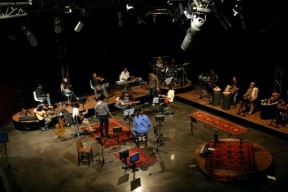 But throughout it all, what was most endearing about the second season was its naturalness — you could see wires running on the floor, technicians going about their work, a glimpse of a harried Rohail sometimes if you looked carefully enough, a mistake or two by the singers and an exchange of sheepish smiles, the perceptive nods of acknowledgement of greatness by the house band. It was also the unhurried pace, the cock-a-snook at commercialism and the sheer passion of the people involved. It made me a CS lover for life.
But throughout it all, what was most endearing about the second season was its naturalness — you could see wires running on the floor, technicians going about their work, a glimpse of a harried Rohail sometimes if you looked carefully enough, a mistake or two by the singers and an exchange of sheepish smiles, the perceptive nods of acknowledgement of greatness by the house band. It was also the unhurried pace, the cock-a-snook at commercialism and the sheer passion of the people involved. It made me a CS lover for life.
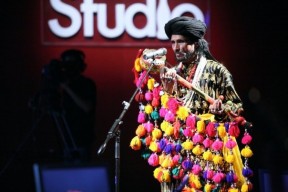 But the world caught on. Season 3 came in sooner than I liked. Sometimes one ought to be given time to wait. It pained me to observe that already, there were subtle changes in CS 3. It could just be my imagination but the presentation was more.. how shall I put it, slicker, smoother. More professional perhaps but surely more clinical as well. There was none of those human foibles to be found even if you looked hard enough. The soul though was still not lost; there was still magic in the air. There was Arif Lohar to gurgle at in ludicrous happiness and there was Tina Sani to marvel at in moments of spiritual bliss.
But the world caught on. Season 3 came in sooner than I liked. Sometimes one ought to be given time to wait. It pained me to observe that already, there were subtle changes in CS 3. It could just be my imagination but the presentation was more.. how shall I put it, slicker, smoother. More professional perhaps but surely more clinical as well. There was none of those human foibles to be found even if you looked hard enough. The soul though was still not lost; there was still magic in the air. There was Arif Lohar to gurgle at in ludicrous happiness and there was Tina Sani to marvel at in moments of spiritual bliss.
CS though was rapidly becoming a worldwide phenomenon. It made Pakistanis justifiably proud and gave a nation, in serious crisis of self-esteem and confidence, a thicker straw to clutch at but it also had a reductive effect. It became what it wasn’t — it became a television show.
In my earlier blog, I had wondered why nobody was thinking of a Coke Studio in India. Now apparently they are. And in a month’s time, there will not only be an Indian Coke Studio but also season 4 of the Pakistani one. As somebody commented on FB, ‘Hamara CS, tumhara CS, hum sab ka CS!’ I should be jumping around in joy that my two-year-old wish was being fulfilled. But strangely all I feel is dread. All I can imagine is the kind of crass, intrusive programming that I have seen on Indian television for nearly a decade now. I can imagine Christmas-tree anchors screeching into the mike, Idea sponsoring every Bollywood wannabe song (leave this particular idea alone sirji) and worse, a red interactive panel at the end of every song asking the viewers to rate it by SMSing to 5858 and win a CS logo T-shirt and CS keychains.
I feel like a kid who had a single unique toy which is now being sucked into a toy machine that will churn out copies to be given to other children who already have many toys to play with. But I am a cynic. Of the better kind. A cynic who wants to be rapped on the knuckles for such cynicism. A cynic who wants this season of music to wash away all her doubts and misgivings.
The world is too much with us, said Wordsworth. I am sure he wasn’t talking about Coke Studio. Was he?
Rashmi Vasudeva is a journalist and applied for a scholarship offered by the European Commission to do a Masters in ‘Journalism and Media within Globalisation: The European Perspective’. She won the scholarship, one among 18 people worldwide to do so. She is currently in the final year of the course, specialising in ‘War and Conflict Reporting’ at the Swansea University in the UK. She loves to write on food, culture and travel. More about her on www.rashmi-vasudeva.com






